This post may contain affiliate links and Corporette® may earn commissions for purchases made through links in this post. As an Amazon Associate, I earn from qualifying purchases.
Some of our favorite mid-range suits for women (which sometimes have such frequent sales that they come down to the same range as our “budget” suits) include Ann Taylor, J.Crew, Talbots, Banana Republic, Brooks Brothers, and Antonio Melani. (Talbots and J.Crew usually have plus sizes, and the others offer petites.)
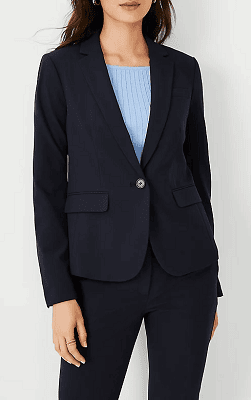
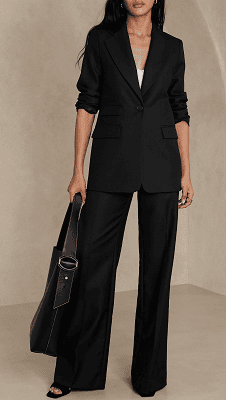
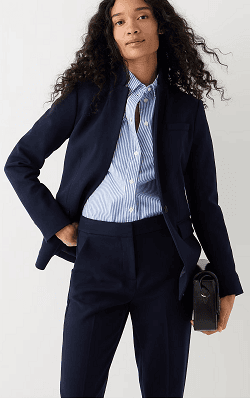
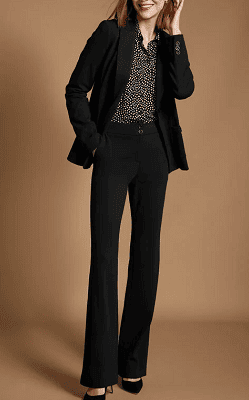
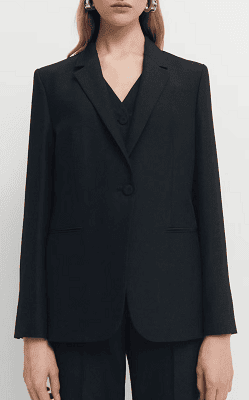
We got an interesting e-mail last week from LPC of Privilege: A High Wasp Stops to Consider, offering to write a post giving advice to newbies from her much higher position. She’s got some great advice in here!
Your first big job. Congratulations. By big, I mean in an institution of substance, as a lawyer, a banker, a corporate new hire. We are talking the world of salaries, hierarchies, protocol. And expectations about dress.
Of course this is not the only path. Some people work in design, in small businesses, in retail, at home. But our world has very particular requirements for what to wear. Hence Corporette. Hence this wardrobe advice to women at the beginning of their careers, from one towards the end of hers. I started out in 1981, fresh out of business school, at a large chemical company, and left the corporate world in 2009 as a vice-president for a software services startup in Silicon Valley.
Nice to meet you.
What to wear in an entry level job makes most of us nervous. It’s new territory, after all. You are supposed to be a little unnerved. We read up. Ask friends. I remember worrying about the fullness of my first skirted suit, was it too much like a party dress? The thing is, there’s no one answer. There is, however, a very simple process to follow to get it right.
The Strategic Principles
- Your clothing sends signals about who you are. Into a very distinct culture. Which varies enormously from corporation to corporation. On purpose. CEOs believe that a strong culture gives them the power to effect change and accomplish goals. They are right. Support their efforts. Fight any battles for change in other arenas, from a position of strength. That’s a lesson useful in areas beyond wardrobe.
- Your clothing also talks to you. All day long, are you are comfortable or not, fitting in or not, wearing your favorite colors or fabrics or shapes? Or not. If, as they say, a brand is a promise on which you have to deliver reliably to your customers, your professional image is your brand, and it’s got to be one you can deliver. Sustainably over the long, long term. You should feel good in your clothes. Anchored. In the context of your company, or firm culture, of course.
The Bullet Points
- Men pick up different signals than women
- Requirements for dress vary from function to function
- Navy blue really is the corporate color of choice
- Fabric – not too little, not too much
- Keep your style rebellion subtle
The Speaker Notes
Men And Women
Men pick up different signals than women. No matter what you do, most likely most men will be assessing whether you are hot or not. They can’t help themselves. Ensures continuity of our species, so let’s just assume it’s not a bad thing and let it go for now. As long as they behave professionally. Hot is off the table. Assess your clothing to make sure you are doing your part to keep it off the table. I’m not saying that you make yourself unattractive. But hot is off the table.
The women senior to you are hoping you succeed. Unless you want to take their job or steal their thunder. We worked really hard and put up with all kinds of stuff exactly so that you could have an easier time than we did translating hard work into success. This also means we really don’t want you to wear clothes that get in your way. I have been asked, twice, to tell entry-level professional women that their clothes were inappropriate. Both cases involved underwear showing through white. Yeah. Don’t do that.
We also understand that imitation is the sincerest form of flattery. You are more than welcome to tell us you like our shoes. Not in front of the guys, though. Provokes too many jokes. You are more than welcome to ask us what we think about possible clothing purchases. Assuming we’ve said more to you before than, “When will your manager be back?” You are more than welcome to start dressing like us. Just don’t spend more money than we do, please. It makes us wonder if you really need this job.
You might wish what I’m saying was different. I might wish it was different. But wishing it was different and working with what is are two separate tracks. Both important. I’m talking the what is track here.
Varying Functional Requirements
Requirements vary from job function to job function. Each area has its uniform. Pretty much as you would expect, sales, polished, marketing, a little flashy, finance, a little boring, engineering, a little quirky, manufacturing, strong-toed shoes. Flippant, perhaps, but largely true.
Navy Blue
For some reason that anthropologists have yet to explain, the American corporate color of choice is navy. Gray is safe, black not dangerous, but navy is both friendly and authoritative. Think airplane pilot. Good airplane pilot. What is he or she wearing? Navy.
Fabric, Not Too Little, Not Too Much
You know already not to wear too little fabric. No cleavage. No exposed high upper arms. No too short skirts. No too tight sweaters. (You do know that, right?) But you should also shy away from too much fabric. Beware ruffles, full skirts, overly-wide legged pants. Why? I have no clue. Perhaps for the same reason that army uniforms are fitted. No danger of cloth catching a bayonet in the heat of battle. But trust me. For entry level, keep your clothing tailored but not tight.
Unleash Creativity Only On Jewelry, Shoes, Bags. At Least At First.
You can carry that bright green bag. Except maybe to a sales call. (Or to court. I’ll let the lawyers weigh in there.) You can get creative with shoe ornaments, or two tones. You can tuck a peace sign necklace down that button down shirt. Or a Republican elephant. Rebellion takes different guises in different cultures.
With these principles in mind, here is your strategy.
- Show up Day One with a few good basics. Do NOT buy out Ann Taylor in advance.
- Observe your peers and your superiors carefully. What do they wear? For customer/court contact? Routine days in the office?
- Add to your wardrobe in the first few months. Mostly what you see around you.
- Find some small but tangible ways to brand your individuality. Otherwise known as style.
Must Have, Start Your Job Pieces, In The Best Fit And Fabric You Can Afford
(Note from Kat – we’ve kept Lisa’s advice (in words) but added in our latest favorites for the items mentioned…)
This post contains affiliate links and Corporette® may earn commissions for purchases made through links in this post. For more details see here. Thank you so much for your support!
1. Navy pants suit.
Doesn’t have to be dowdy. Stretch wool is always helpful.
Some of our favorite budget-friendly interview suits for women include stores like Banana Republic Factory*†, J.Crew Factory*†, Mango*, and Express†, as well as widely available brands like Anne Klein Executive, Vince Camuto*, Calvin Klein*†, and Tahari ASL. For a vintage vibe, check Amazon seller Marycrafts*. (* = some plus sizes also, † = petites)
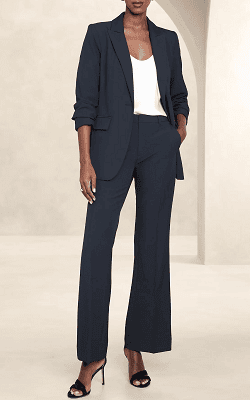
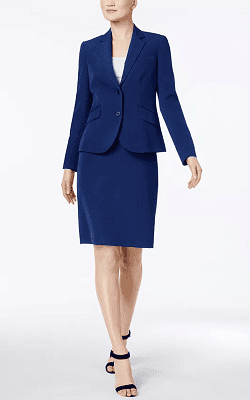
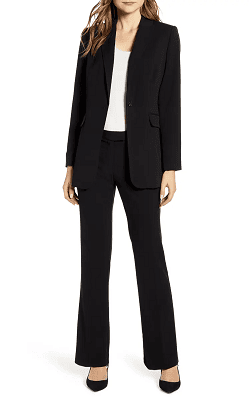
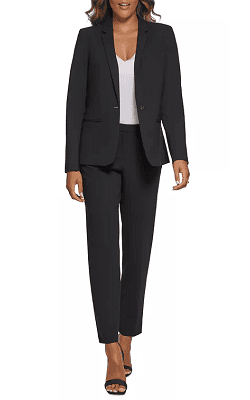
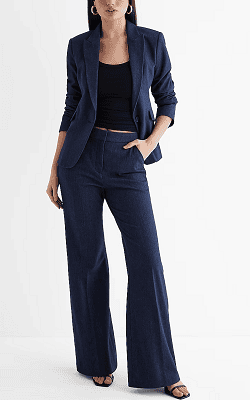
2. Dark jacket(s) to wear with navy, gray, black and khaki trousers.
Some of the best blazers for women in 2024 — great for wearing as separates! — include options from Cinq à Sept, J.Crew (collarless and collared), Everlane, and Madewell. Hunting for a deal? Check out J.Crew Factory and Amazon (Cicy Bell, The Drop).

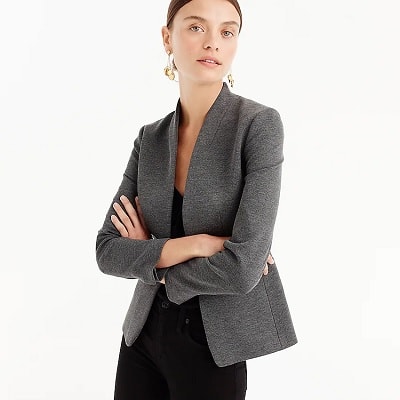
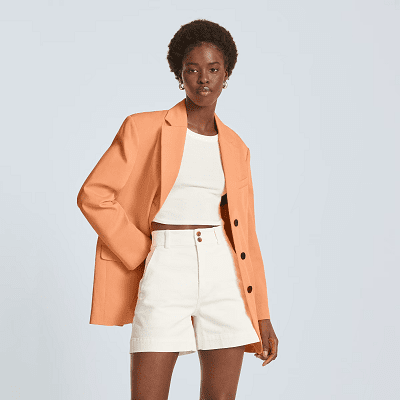
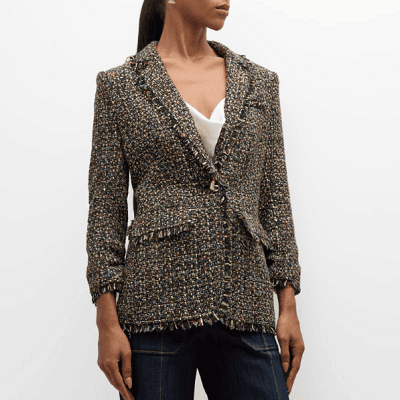
3. Cardigans
I’ve been informed by experts that J. Crew does a good job of mid-range cashmere. Oatmeal is a great neutral for many, especially when your skin tone says no to gray. Extra points for knowing that, on TV, we all look best in earth tones.
Some of our favorite classic cardigans for the office as of 2024 include those below — definitely check Talbots and J.Crew Factory if you’re looking for plus sizes, and Quince is always a nice affordable option.
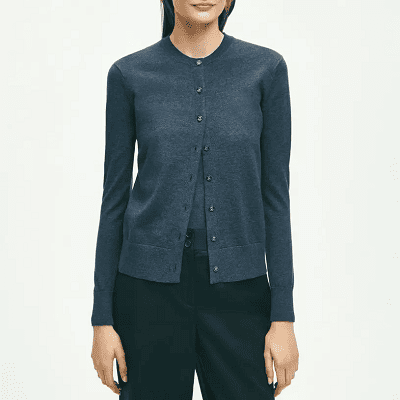
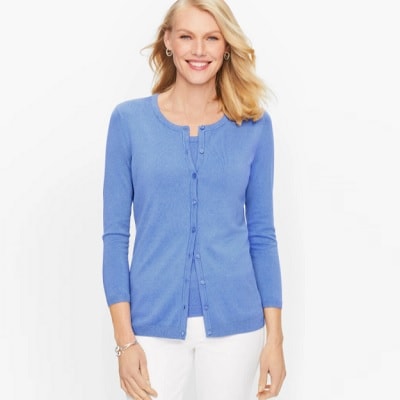
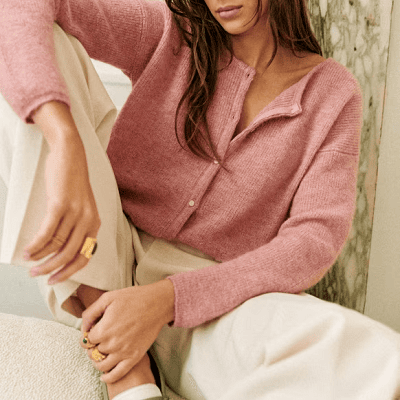

4. The button down
Confession. I hate button downs, they constrain my shoulders, and cause shirtfront gap anxiety. To say nothing about untucking every time I wave my arms to make a point. But I wear them whenever I visit the financial industry. When in Rome.
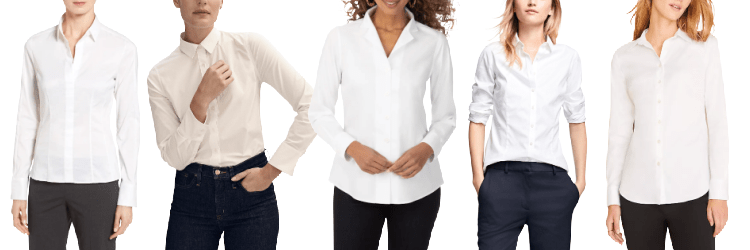
5. T-shirts
I’ve found Petit Bateau to offer the best quality, but Banana Republic, Old Navy, anything will look OK for a few months before pilling. Cotton in summer or any time in California. So comfortable that they will not contribute to any job-related tension. Cover with the cardigan or jacket if you’ve got to look extra formal.
Looking for the best work-appropriate T-shirts? As of 2024, some of our favorite dressy T-shirts for work are from Amazon Essentials, Theory, Everlane, J.Crew, Banana Republic, and Vince — also check our posts on opaque white tees and the best plus-size tees for work!
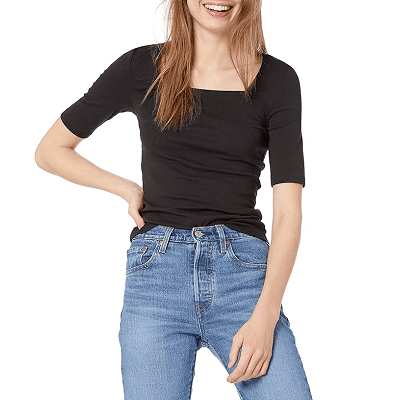
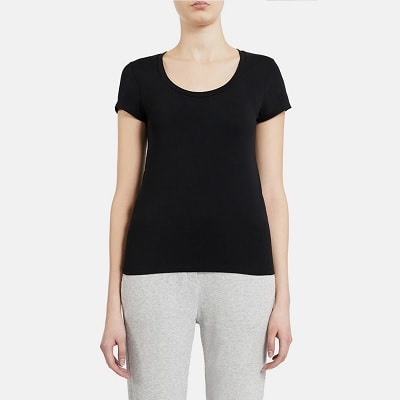
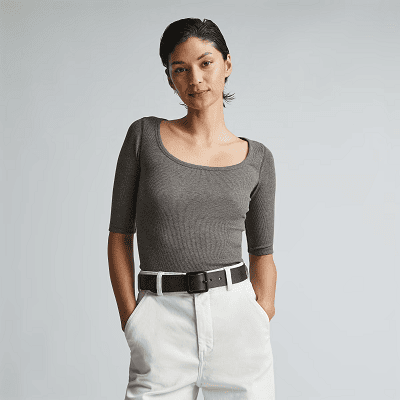
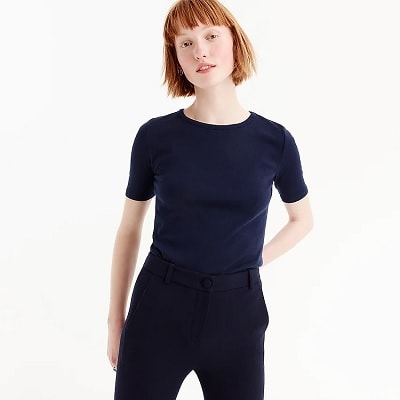
4. Cotton/cashmere blend for colder areas.
Or offices where they just can’t figure out the thermostat. Drives me nuts.
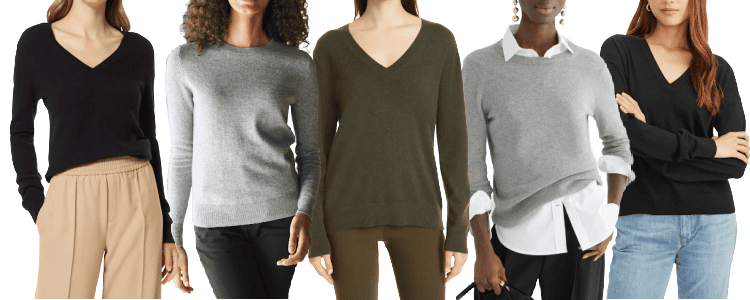
5. Flat or 2.5 inch heels, no toes, in colors that match your trousers.
Skirts really do look better with heels on the higher side. Stuart Weitzmans are comfortable, and good shoes can last a decade. Trust me.
These are some of our favorite comfortable low heels for work as of 2024… also check out CK Calvin Klein, Trotters, Sam Edelman, and Sarah Flynt!
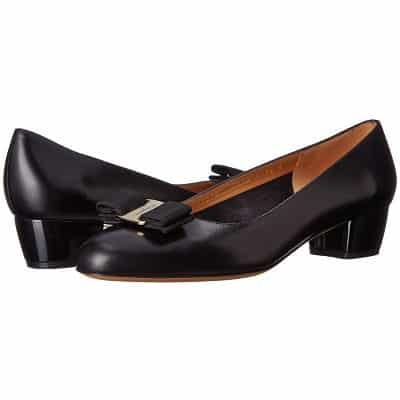
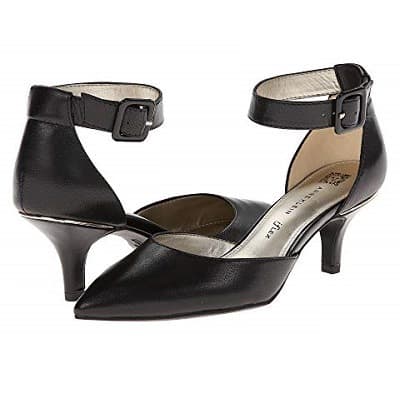
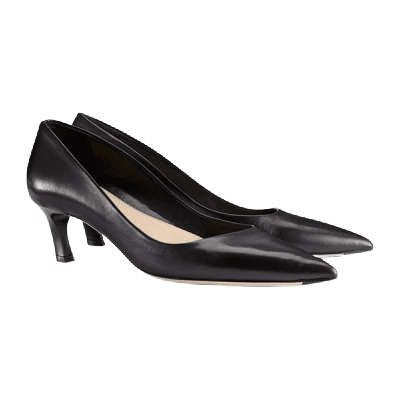
6. Invisible underwear
Surely we don’t need a picture of underwear?
When to Show Personality and Flair at the Office
So, is that all you ever get to wear? Shades of white, black, earth and quasi-military tones? Are you doomed to a life without aubergine? No. Now you go to your new office. You look around. You observe. You travel a foreign land, and you watch. You add pieces in accordance with what you see. All the men wear those french blue shirts? Go get one, if only for the key sales meeting. The Director of Marketing sports a pair of red shoes? OK then.
Before I even began my corporate career, when I was still in business school, I happened to attend a law firm party for summer associates. One of the few, if not only women partners was there. I will never forget. She wore a pin on her shoulder. Silk violets. Large, I mean it was LARGE. I told her I loved it. She said that at this point in her career, she felt she could wear flowers if she please. Impunity. Once you close the deal, beat your numbers, win the cases.
The first time I stepped outside the standard corporate wardrobe was on my 30th birthday. I bought a dress. Sure, it was navy, had buttons, a belt. But this was 1986, and I was living dangerously in a dress. As was one of the top 3 salespeople in my region, I had the right. My most recent, and possibly my final act of rebellion? Of tongue-in-cheek personal style? A Hello Kitty diamond necklace. By the time I hit 50, I knew what I could and did contribute to an organization. And if I wanted to hang a silhouette of a kitty with a pink hair bow around my neck, I would. Except at a sales pitch to the New York Stock Exchange. Personal style statements need to be made to the right audience.
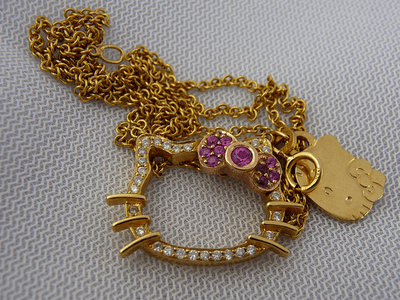
Other Resources
If you have a tolerant, perhaps high technical workplace, there’s no better place to look for inspiration than Audi at Fashion For Nerds. This week she writes on adding pizazz to corporate wear. And I recommend that anyone interested in style that works for your particular shape go visit Imogen Lambert at Inside Out Style. This week she writes on how to add personal power in the workplace. Very apropos.
(Social media images via Stencil (slightly older woman leaning in to share secrets with a younger woman).

City Girl
Great post! You really capture exactly why clothing choices do matter and give solid recommendations.
Anonymous
Wonderful post – thank you!
Kalorama
Fantastic. Thank you.
LPC
Thank you all. It’s my pleasure. Now go forth and conquer, please?
Anon 1
I absolutely disagree that when your coworkers make the “hot or not” assessment that you want to be in the “not” group. People associate with people they like. Until they get to know you and see your personality they base that on looks. As an associate lawyer, your clients are your coworkers. You make your hours if they give you work. Men generally like attractive women. You don’t want to just be known as the “hot new girl” your whole career but if you can get your first couple assignments that way, do a stellar job, and THEN get recognized for your intelligence, at least you finally got recognized. Meanwhile, Ugly Betty is still stuck doing the filing while you are second chairing the big trial.
Just to be cautious, I’m not saying look skanky and have your boobs hanging out of your too tight suit. What I am saying is look professional but by God, feel free to look attractive *gasp* even hot. Only then will you feel confident too.
J
Honestly, I was the “hot new girl” 5 years ago (that now seems totally comical, it’s amazing what 5 years, 10 lbs, and marriage will do for your image). It created a lot more problems than opened doors. I was not going out of my way to look “hot” — and I certainly wasn’t veering into inappropriate dress. I was just trying to look my best. To this day, I know that there are a few select individuals who will never think about me as anything but “the hot new associate” and I wish I could have a do-over. Tread carefully — obviously ymmv.
Rachel
Yep, but eventually the “hot girl” star falls and “Ugly Betty” wins the day. Seriously, if men are looking at your tits, they aren’t having you second chair trials because they will be concerned the jury is looking at your tits. But, hey, knock yourself out. Leaves more room for the “Ugly Bettys” (and BTW, I’ve first chaired trials without trying to be the “hot girl.”) And if I were the person giving you work, which I would be – I would not be giving you work because this kind of attitude shines through. Girls rely on looks when they can’t rely on brains/skills.
Anon 1
Rachel, I think you read my post the wrong way or I was too passionate in the way I wrote it. I tried to specifically say to dress professionaly and not have your tits hang out. I think there is something messed up when we tell women to try to not look hot. What if you are just naturally hot, like J wrote about above. Should you dye your hair something other than its natural nice color, maybe rub something on your skin so you get a few pimples? You can dress as professional as you can but when you have been naturally blessed with good looks there is not much you can do about it.
I’m sorry if this post sounds like I’m full of myself but I swear to you I am not. I think I have great work product and do a great job. But, I am tall, and blonde, and skinny, and have blue eyes and I am friendly. So, no matter what I wear, some people may consider me hot. I wear pants suits, and flats, and no cleavage and everyone knows I am married and off the market.
I think it is mostly women that immediatly hate other attractive women. I just think we strive so hard to be taken professionaly that we forget all the studies that show attractive people tend earn higher salaries and have more job opportunities. It is good to look good and feel good about yourself.
If I don’t put in my (clear) contacts, put on some make up, straighten my hair, have clothes that are not huge on me, I feel ugly and not confident. When I look my best and feel my best I might be seen as hot. But that is when I do my best work and when I think I get taken seriously.
Anonymous
Wow, I think the author was saying that it’s not about “hot” and “ugly,” but about “hot” and “classic” “attractive” or “professional.” Classic and professional attire does not equal ugly, nor do I think the OP was insinuating that. Rather, she quite rightfully pointed out that looks matter, and women have to make sure that they are recognized for their brains, not their bodies. All women should venture to look attractive at work…but not “hot.” Hot connotates sexy, “attractive” connotates tasteful.
If you are tall, thin, and blonde (like me), then by all means look attractive and let your beauty show! You don’t have to look hot to look beautiful! Natural makeup, medium heels, nair nicely kept back or in a tasteful bun or twist, twin sets, skirt suits, classic jewelry (pearls, diamonds), button-downs (with a tank underneath to prevent gaps and showing underwear) and tastefully fitted clothes are all excellent. No one would say that a cashmere twin set is “hot”, but that’s the point. Leave the too-tight, too-sheer, and too-short clothing at home with your heavy “date night” makeup.
SUCL 3L
Rachel – I think I kind of understand the point you’re trying to make. While I don’t really consider myself “hot”, I have come to recognize that I have a figure that may be considered sexy. Meaning, that I have long blonde hair and blues eyes, a substantial bust and a (comparatively) small waist. I have come to learn that there are certain things I need to be careful of (such as the infamous button-front shirt-gap and the placement of neck-lines), but at the same time I refuse go around dressing like I’m ashamed of the figure God gave me.
I doubt that the OP’s “hot or not” comment was suggesting that attractive women should be ashamed of their assets. Different people have different definitions of the word “hot”. I, personally, find something very “hot” about a professional woman dressing like the strong, classy lady she is (but that’s just how I use the word). By saying “not hot”, I doubt the OP meant dowdy. My guess is she simply meant don’t dress like a skank.
Fantastic post LPC!
Rachel
I appreciate your response post. I don’t think that the author was suggesting that you should ugly yourself up. If you are beautiful, you are beautiful. People do tend to gravitate toward attractive people. And we all want to feel attractive, which is why we come to Corporette and talk about fashion. But there is a difference between looking attractive and actually trying to look hot. And trying to look hot or embracing being the “hot girl” is not a good career move long term. It doesn’t sound like you are doing that, from your second post. I guess I had some backlash too – because we all know the “hot girl” who ended up getting fired or having some kind of relationship with a partner or something. I work with a lot of beautiful women. I don’t think beautiful is something to try to cover up. But beautiful and hot are different things, and I don’t think a professional woman should be striving for “hot” at work.
Midori
Think Legally Blonde. Remember that moment where Elle is all “aw man, I thought they were valuing me for my brains and work but it turns out I’m just eye candy for the team”? Yeah, you don’t want that moment.
anon - chi
I thought the OP was drawing a distinction between women who are considered attractive vs. those who are thought of as “the hot girl.” She certainly wasn’t advocating making yourself intentionally unattractive. I agree with Anon 1 that you may benefit from being considered attractive, but there can be a certain stigma attached to being the “hot new girl” – it may not be fair, but being thought of as “hot” may also mean people assume you are not as smart, driven, authoritative, etc.
Lee
J, if you became the “hot girl” but didn’t dress inappropriately, what exactly would you do differently? I am a little bit confused about what this advisement is telling young female professionals to avoid doing. My inclination is that becoming the “hot girl” has more to do with how you act than how you look, assuming a conservative style of dress.
Karen
I was just reading something written by a guy (he’s written some book he’s promoting) where he said that clothes that we women think of as tasteful and attractive may be sexy enough to get a guy thinking about our assets rather than our sales pitch.
I think the valid part of his message was, at least when you are in an important meeting (whatever that means for you at your level – could just be presenting the results of your work to a senior person you haven’t yet proven yourself to, or could mean making a big presentation or being in court if you’re at that level) be sure to dress ultra-conservative to make it easier for men to focus on your message and not the physical attributes of the speaker. If he’s mesmerized by your eyes, he may still manage to take in what you’re saying, but if he’s distracted by your (tasteful but asset-emphasizing) crossover sweater, he may not.
I don’t know if he’s right or not, but it’s something to think about.
I don’t think anyone says try to look less attractive than you are – the only question is how sexy (“hot”)/pretty (“girly” and feminine) you want to look, versus more businesslike and buttoned up.
Clerky
Hmm, I have always been one of the “pretty girls”, not sure about hot though. It has definitely helped me in the workplace. It’s not fair, but men like to work with attractive women who are also, of course, very smart and professional. I don’t see anything wrong with highlighting your positive attributes in an elegant and understated way. I clerked for a very nice (and non sketchy) male judge who always told me I looked great. Sexist? No, I don’t think so. We had and have an extremely professional relationship.
I absolutely love this post by the way, it is a wealth of excellent information. I and others would be very happy if you could write a regular feature on Corporette. Thanks so much!
AIMS
This seems like one of those issues that comes up because people have different definitions of the words used. I think there is a difference between being attractive (helpful) and “hot” (can be helpful or hurtful).
I think being attractive can definitely open doors, and if you can rise to the occasion — fantastic. But actually coming of as a “hot girl” is a different story and can often, sadly, be limiting.
LPC
Clerky, thank you.
Amy
Hot is great until you hit your mid-thirties and still try to make it work. I’ve worked with some women (one made a point of telling people in roundabout ways that she had posed in Playboy at one point) who are still trying to play the “hot/cute/attractive” card at 36 or 38 and it honestly is just sad. And it doesn’t work. In women over 35, people are looking for results and work experience and good recommendations. You may be getting better assignments and plum positions now partially because of your looks, but please, please do not expect that to last. There will always be some younger, hotter woman coming along to knock you out of the catbird seat, attractiveness-wise. Yes, men like attractive women – a corollary to that is “young.” I hope that by the time a “hot girl” hits their mid-to-late thirties, they have shifted their focus and have something to show for their work other than “I was the hot new associate 10 years ago.” And as far as getting “better” assignments – I sat in a meeting one time with a senior executive who was deciding who to take with him on an upcoming trip to meet management of a company we were merging with. When one (very attractive) woman’s name got mentioned, he shifted in his seat and said “I think she might prove to be distracting in the wrong kind of way.” She didn’t get invited to go. The sword definitely cuts both ways.
Corporate Tool
Thank you so much!
I just moved from a (relatively) casual boutique into Fortune 100 corporate world. I now feel justified in wearing my navy suit on my first day of work (my husband says it makes me look like an airline pilot–now I know that’s a good thing ).
The gold digger
1. You need starch to get the wrinkles out of your cotton blouse.
2. Patterned hose make you look like a hooker. Yes. It does.
3. Always keep an extra bra and pair of panties in your gym bag.
4. It can be very, very tempting to wear clothes that make you look better than your (female, has awful legs, went to college on a field hockey scholarship and dresses like a Philadelphia pimp) VP. It’s not hard to look better than your VP. Try to resist the temptation.
Just trust me on these.
PS And no perfume. It’s not professional and those of us who get migraines will thank you.
v
The pimps and hookers in your area sound weirdly conservatively dressed.
The gold digger
The VP wore a suede vest with fur lining around the edges. With crushed velvet capris. All that was missing was the purple beret.
And she actually had a personal shopper. Who was the wife of one of her senior managers. Not a good career move for the manager if you ask me.
v
Apologies for my skepticism, then. Man; I wish I could have seen that one in person.
divaliscious11
Couldn’t have been too bad..she, after all, was the VP, making enough $$$ for a personal shopper. Maybe the vest and capri’s were her version of the above flower/Hello kitty pin. I tend to wear what I want. But I have delivered results, so don’t get the same scrutiny. We do need to remember that this is written for the entry level.
S
I disagree with your opinion that perfume is not professional. When you work in close proximity with others, you definitely do not want that chinese food you ate at lunch to be what they smell oozing from your pores when they come talk to you after 10 hours in the office. Nor your sweaty armpits.
Morning shower followed by deo and a dab of perfume before going to work goes a long way in making sure I ‘smell like a rose’ after I’ve just worked 12 hours straight.
If you get migraines, I’d suggest you politely request those working in close proximity to you to lay off the perfume. I would do so as a favor, if asked, and others would consider it, I’m sure. But I think a blanket ban on perfume in the workplace is not the way to go.
Some of us (sweatier than others) need it.
anon
no, sorry. perfume is never ever appropraite in the office. i really can’t imagine working with anyone who actually wears it at work. only once on a morning train did i notice a woman wearing perfume — and that seems odd to me too: putting on perfume in the morning.
KLo
I’m another who’s really sensitive to smells (had to have coworkers keep office doors shut because I was in a cube when they received lilies, etc.), and perfume CAN be perfectly acceptable, but it’s rare that the only person to smell it is quite close. One of my very best friends has a sweat problem and she uses the prescription strength otc deodorants wherever she gets sweaty. She also brings baby wipes and dry shampoo and will take a mini shower after lunch to maintain freshness. There are other ways to mask what you perceive to be an offensive odor in a way that doesn’t give others migraines (or turn their stomachs).
The gold digger
Unfortunately, I didn’t know who was wearing the perfume that I would smell every morning as I walked down the hall. If I can’t smell it unless I am close enough to kiss you, that’s one thing. But if it lingers in the hall or the elevator, you’re wearing too much. I am very sensitive to smells – perfume, hand lotion, whatever (all my cleaning and grooming products are fragrance free) – and it is hard to function with a headache all day. (And my insurance only gives me nine migraine painkillers a month, which I guess is fine, because my doctor says any more than that and my liver is going to fail. Oh good!)
I’d rather not smell the Chinese food from lunch but I really don’t want to smell the Chinese food from lunch topped with perfume! :)
MelD
I couldn’t agree with you more. I’m the type who is so sensitive to certain scents that I make sure to walk around the perimeter of many department stores just to avoid the perfume counters. Many scents will trigger both an asthma attack and a migraine, which in turn makes me feel light headed and dizzy. I would much rather stick my nose in a Chinese takeout container for an hour than have that perfume related experience if I can possibly avoid it.
jc
Trust me, for those of us who have a sensitive sense of smell, you are not fooling anyone by using perfume to cover up that chinese food smell (or any other smell)… all we smell is the perfume AND the chinese food. Personally, I rather smell the chinese food rather than a combo of perfume and chinese food! You might think you are using a small amount of perfume, but really, we can smell you when you come in in the morning!
L
Agreed! I have NEVER smelled perfume on someone at work and thought “oh that’s nice.” Maybe because you’re usually not in extremely close proximity to coworkers, so if you can smell someone’s perfume, it’s pretty strong. Nothing worse than the elevator perfume bomb…
Erin M.
We had an intern who wore so much vanilla-y perfume that if she came into my office I felt sick, and my office would reek for hours. So f-ing gross. And I’m very, very sensitive to smell.
Erin M.
You should never wear so much perfume that someone not standing close enough to hug you can smell it. It should not even be smellable at a handshake distance.
If you can follow that rule, perfume is perfectly appropriate for the office. Sadly, at least 50% of women who wear perfume apparently cannot follow that rule.
Karen
I agree with golddigger, jc and MelD. Relying on perfume to cover up other odors is not a smart move. People may not feel comfortable asking you to stop wearing it, and it may send messages you don’t want to send.
I am very sensitive to perfume – it triggers asthma and occasionally headaches. Perhaps because of my negative associations with those experiences, ALL perfume also just smells BAD to me. Also, I very rarely smell perfume on my BigLaw colleagues (including legal assistants); when I do, I automatically think they’re less serious about their careers, just because it’s something I usually only see admins do. Perhaps the more senior women are wearing such small amounts that only a person getting really close to them can smell it – if so, and if you can do it that discreetly, great, but then I doubt it’s going to be covering up any more potent smells.
I once had to hire a temp attorney to review foreign-language documents on what turned out to be a year-long assignment. I came very close to not hiring her, in part because I was uncomfortable raising this sensitive issue of personal grooming with her and was afraid she’d be offended or that it would strain our relationship. If I’d had an equally or almost-equally good candidate, I would have hired that person to avoid what I was afraid might be an awkward conversation followed by a strained working relationship.
I thought I might be in a small minority in being so averse to perfume, but from the other posts it sounds like I may not be.
Lee
Another iteration of the “avoid looking good” advice. I disagree with this. There is nothing wrong with wanting to look your best and wearing quality clothing that fits you, as long as you are following an acceptable dress code and keeping your hair and makeup conservative. Dressing to avoid looking better than somebody is ridiculous. This type of advice panders to gender stereotypes and is counterproductive to women trying to succeed in a professional environment.
AIMS
I read that advice as simply not trying to be too shiny. You can look your best without looking like you spent half your morning grooming and picking out which heels to wear. But maybe I’m not being hyper-critical enough ;)
Sharon
Great post!
Rachel
Great post!
TGEmpress
While I find much of the advice very positive. I just take personal issue with the navy suit portion. Maybe its the color or the general dowdiness of every navy suit that I have owned, but I have never felt comfortable or confidant in one. Also, it is not a standard “go to” suit color for at least the female litigators in St. Louis that I work with, see in court, depositions and interviews, that would be black, gray and any combination of others.
I also have never found shoes that I like to go with the navy suits that I owned…. big negative there.
As to taking the creative accessories to court. At least for the city motion dockets, bring it along. It will give us something to pass the time talking about, there are always more than a few women there. For the rest, probably stick with more demure. However, it depends on your venue, opposing counsel, and so purpose of your trip to court. If I am headed up for a quick hearing and the judge and opposing counsel are all women, then bring it with you, style is generally appreciated. If you are in a rural venue for a jury trial, then probably basics and the less noticeable, the better. But the in-between is where it is tricky.
These are only the thoughts of one humble associate. Take them for what they are worth.
v
Also, it is not a standard “go to” suit color for at least the female litigators in St. Louis that I work with, see in court, depositions and interviews, that would be black, gray and any combination of others.
I’d be interested on anybody’s opinions as to whether this is a lawyer vs. non-lawyer thing. A friend who went to business school before law school once remarked to me she was surprised at how few lawyers she saw wearing navy suits. And they do seem fairly rare in my law firm too . . .
Emily
I’m also a Midwestern litigator…during my internships/clerkships in the St. Louis area, can’t recall seeing women wearing navy suits often, if ever. Ditto now that I’m working in a smallish-sized town. The “go-to” colors for women seem to be black, gray, and brown, though a partner in my office, the only other female attorney in my office, also has been known to wear a dark green suit and a plum suit from time to time.
I personally don’t own a navy suit and wouldn’t feel compelled to buy one unless it was super flattering.
anon - chi
I see them fairly frequently on men, but I can’t recall ever seeing one on a woman. Even for men, I think the “go to” color is black. I would consider a navy suit but think finding shoes I liked with it might be tricky.
cbackson
Agreed. I’m a West Coast transactional lawyer, and I don’t see women in navy suits pretty much ever. In fact, it’s exceedingly uncommon to see a woman wearing ANY color of suit in my office, unless she’s going to court or a client meeting.
Anonymous
I absolutely LOVE my navy suit as I prefer “cool” colors, and black often washes out those of us who are fairer. What a shame people don’t wear them as a nice cool neutral more often.
Erin M.
I’m a lawyer in DC. I love navy suits (and brown ones) and wear both of those colors a lot. But I feel like 90% of the women I see in suits wear either gray, black or pinstriped gray or black.
ARinFL
I agree… I love brown suits. They are not worn enough.
S
I agree. I work in the financial services industry and have worked in mgmt consulting before.
Black or charcoal or even greyish suits are the way to go. Not navy. In particular, I’ve never seen them on women (and only occasionally on the men).
Eva
Finance here, too. Black is go-to, NOT navy.
M
I agree about the navy suits. The problem is in the shoes. It’s really hard to find good navy shoes, and one “navy” is not always the same as another “navy”, so you can’t always wear the same navy shoes with everything navy. Unless you can get away with red shoes or something like that. I really like blue and I would wear navy a lot more often if I didn’t have this major problem with shoes.
AN
try pewter / grey shoes with navy (instead of navy shoes). or wine/burgundy.
Erin M.
Cordovan or gray shoes are best. Don’t try to match the navies.
Midori
I have a pair of patent oxbloods from Franco Sarto that go pretty convincingly with my navy suit. Which, by the way, is actually separates–a pinstripe pant with a solid jacket. Kind of helps avoid that “airline stewardess” look, IMO.
Karen
I just wear my black shoes, and carry a black bag. My navy suit is not dark enough for that to look unintentionally clashy.
I think navy has been out of fashion for a while, so there haven’t been a lot of suits to buy. I think it’s a good professional color, though. I do think it looks a little more formal and professional than brown (which is also nice but I prefer it for in-office days).
LPC
I’ve always worn black with navy.
Mama JD
I agree that navy is not necessarily the “go to” color for lawyers. In DC and a couple of the Southern states where I have litigated, black seems to be the “go to” color. It’s likely that the business world is much different. I do adore a beautiful navy suit though – they are just so hard to find.
anon
I saw a professional woman yesterday in a navy skirtsuit with a cream top and blonde hair and thought…. flight attendant. I decided at that moment not to buy a navy suit.
LPC
I think this is a law thing. In the corporate world, we wear navy. Navy pantsuits. All the time.
J
Thanks for this. I always stick to black, charcoal, and gray suits. I never felt that a navy suit was a “must” in the big law firm where I work.
In addition, on a limited budget, I buy shirts/shoes/accessories/handbags/work totes/coats/boots that match all of my shades of black and gray suits and don’t have to get items that will only match my one navy suit but won’t coordinate with everything else.
I’d love to hear if any lawyers feel that navy is essential.
eemusings
What a great – and indepth – post!
JB
Funny, I was asked by a stranger in the elevator at the courthouse on my first day of work whether I was a flight attendant, presumably because of the Navy skirt I was wearing. Not sure that flight attendant=pilot, but there does seem to be an association between Navy and “uniform.”
3L
Good stuff!
Samantha
I liked the article very much, and I follow your own blog from time to time, LPC. I would like to make one constructive suggestion on your linguistic style though, take it with a pinch of salt or let it go if you don’t like it, ok?
I find one-word sentences hard to read and they come off sounding like you are saying the words through clenched teeth.
e.g. “T-shirts.” “Impunity”.
I know this is a style thing, and you may be using this style to emphasize your words or to provide more ‘punch’. However, my suggestion to you is not to overuse it, as the writing flows better when it ‘flows’ i.e. without abrupt stops.
End of unasked-for advice. :)
Anonymous
Agreed. I thought the suggestions in the post were interesting and valuable (though I don’t necessarily agree with all of them), but reading the post made my brain hurt.
LPC
Huh. Interesting. I write this way on purpose. I look to evoke emotion, as much as I do to convey information. However, I suppose it does no one any good if I am hurting brains. I have no objection to feedback, by the way. It would have been very tough to get very far in the world if I minded. So feed away.
Lawgirl
Wow, I will model your receptivity to feedback, LPC. I can be defensive, pouty, and peevish when I realize I’m not the greatest thing on earth. LOL. I think it will help my career ;-D
ARinFL
LOL!! Me too, Lawgirl. Me too.
Sort of similar (sort of different): I was watching Jack Bauer re-runs from Season 1 the other day and there is a scene in which the then-Senator Palmer is given a very nice compliment… Something to the effect of “You are a wonderful, gentle, and honorable man. The country would be lucky to have a man like you running it.” His response was quite simple and yet elegant. He thanked the complimentor and then stated that it was quite an unexpected compliment and he was very grateful for it. I realized immediately that graciously accepting compliments can be extraordinarily difficult. Yet, when giving the compliment, it the receiver blows it off (“oh, this old thing? this is nothing!”) the complimentor can often feel almost put out, which is almost the opposite intention. Graciously receiving compliments is, in my opinion, something worth striving towards.
Samantha
Me three, lawgirl. :) LOL.
LPC, very gracious response and I appreciate it.
Karen
Responding effectively to negative feedback (and actively soliciting it) is a HUGE asset in a career. Everyone has a lot to learn from the people they work with, especially early in their careers. When you react positively, you encourage seniors to communicate with you about how they think you can best help him/her and the organization. When you do what they suggest, now you become their go-to person (because you already know what they care about, and the person down the hall doesn’t) as well as someone they’ve invested time and energy in, so they want you to succeed. I have seen this both in my relationships with seniors and with the junior people who report to me. Assuming your work is halfway decent, this skill will get you farther than almost anything else you can do.
Danielle
I actually like this way of writing. At first it confused me b/c it’s not grammatically correct (as we are taught to write essays in school), but as I have read more of your writing, LPC, I like that you emphasize certain words or short sentences. It’s the way people speak, sometimes, too, lending your writing a more informal, chatty style, which is appropriate for a blog.
k
This is a great post. Thank you.
I’m wearing one of my favorite navy suits today. As far as shoes with a navy suit, I’ve always thought black or black patent are great.
Mama JD
Wonderful post! Please come back and write more advice for us, LPC. Love it! I’ll be following your blog now.
MidSouth Atty
I’m inclined to disagree with anyone who thinks that those shoes and a hello kitty necklace are fashionable or appropriate… as a late 20s litigator in a large firm in the South, we don’t wear navy blue suits either. Black, gray or brown are the suits of choice down here… and I wear dark brown croco pumps with navy pants (I don’t own a navy suit). I also wouldn’t wear either of the T-shirts shown without something over them, but maybe that’s just me… seems like even in a business casual environment one of those t-shirts with a plain pair of pants would be a bit too casual. At least she didn’t recommend nude hose. Ick.
M in CA
I must be missing something. :) What’s wrong with nude hose?
MidSouth Atty
Although corporette did a poll on this a while back and I believe that most people felt that nude hose were acceptable, I completely, completely disagree. Unless you are over the age of 80 they make you look old. I am in court regularly and do not wear hose, and neither do most of the partners I litigate against or work with. Opaque tights in the winter with matching shoes are acceptable, but self-tanner has come far enough to rid the world of nude pantyhose forever. That being said, I do understand that this also may be a generational/work environment thing. But if you live in a warm climate like I do they are just unnecessary and old fashioned IMHO.
Res Ipsa
I think it completely depends on where you practice. Appearing in court with bare legs strikes me as disrespectful.
newassociate
bare legs in court would and did irritate the (female) federal judge i externed for exactly because she found it disrespectful.
3L
I interned for a federal female judge as well and she did not mind bare legs. Then again it was bankruptcy court, if you can appreciate the irony.
However, in general, I am really surprised to hear people say that nude hose are ‘ick’ – seriously? There have been great improvements made in ‘pantyhose technology’ over the years. In fact, I’ve seen plenty of younger women who could benefit from a pair — exactly to avoid the negatives qualities associated with looking like an 80 y.o. as MidSouth Atty suggested (i.e. cover up veins, dry flaky skin, paleness, flab, etc.).
Clerky
I sometimes wear hose to match my skin color when I wear skirts or dresses. I have heard people say that it is very old fashioned, but the female judge who I clerked for last year always wore them and I felt strange going bare legged. My feet also tend to sweat, so I prefer hose so that my shoes don’t get ruined. Increasingly though, the trend among younger women seems to be no hose or black hose or black opaque tights.
Anonymous
another law clerk here and I have the exact same feelings! Some of the women in chambers wear hose so I wear it too this year…and love it because my sweaty feet don’t ruin my shoes!
Midori
I think hose that match your skin tone are very professional. Maybe they are more common up here in the northern midwest than in the South. I used to work in Florida and admit they were pretty rare there. I rarely bare-leg it in formal situations, though.
SUCL 3L
I live in Florida and it’s all the fault of the damned humidity. Wearing hose when it’s unbearably hot and 98% humidity is wretched.
Emily
Every time this issue comes up on corporette I giggle because someone is always agast at the idea of wearing “nude” hose. When I was in high school in the mid-90s, our choir director made us wear nude hose with our skirts for concerts and I had a fit. (At that time, I frequently wore purple, green, and even mustard-colored tights.) My girlfriends in the choir and I all wanted to wear black hose or tights. A few years later, the fashion swung the other way, and I wouldn’t be caught dead wearing anything other than nude hose. My point is – the black/colored tights versus hose debate has been going on forever. (And think back to WWII when women couldn’t get “stockings” and drew the lines on the back of their legs so that it appeared they were wearing them!)
I personally could never do bare legs to work because (a) I live in the Midwest, which means its cold, cold, cold in the winter (I can’t imagine walking around in a skirt and no hose when it’s snowing or even just cold), (b) the air conditoning is cranked up too high in the summer, and (c) my right leg is so full of nasty looking veins (developed while I was pregnant) that I wouldn’t want anyone to have to look at it (body make-up is not something I am willing to commit to for anything other than a special occassion).
My personal take is that nude hose are more formal, and I do wear them almost always. But sometimes I go with black tights when I’m going for a more trendy look.
LPC
Hello, it’s the OP here. And I will use more fluid language, to avoid brain freezes of any sort.
a) Navy suits are what we wear in the corporate world. With mostly black shoes for women. By that, I mean the world of corporations, as opposed to service firms. I don’t know, maybe it’s the proximity to factories? We want to be more “just folks?” I’m sort of kidding. Maybe the reason service firms don’t wear navy is precisely to set yourselves apart from us in the field? I stand by my advice, that is IF if you work for a Fortune 500 that makes stuff, wear navy. Wearing black looks too formal, too stiff. Also, we don’t wear a lot of skirted suits. That looks too prissy. Again, I cede all authority on the legal world to the lawyers, same for the financial services world.
b) Hot is not attractive. Attractive is fine and sets no expectations. Hot sets expectations that you either have to meet or not meet, and either course has its difficulties. Notice that I didn’t say anything like don’t be aggressive, outspoken, polished, or any of that kind of advice that’s given and can be seen as anti-woman. Just take hot off the table. I got very little in my career from my looks, but ever time I did, I later regretted it. Except the smiles. Smiles are OK. Even though I never broke protocol, there always would have been a better way.
c) As far as the t-shirts, try it. Just once.
Faith
Thanks for the clarification. I also read it as one having two options, hot or not, and that you would want to be a “not”. I didn’t read it as leaving room for “attractive and professional just not a skank.”
divaliscious11
Totally with you until this…
“Just don’t spend more money than we do, please. It makes us wonder if you really need this job”
Why do you care. Either I need the job, or I’m here because I WANT to be. Personally, I want the person who is working this gig, at this particular job, because this is what they like and/or want to do versus the person who is here because they have to, possibly don’t want to, and are counting the days until they leave…
AN
Agree with divaliscious! I work because I want to. Doesn’t mean I should be passed over for (say) a particular job/promotion just because I don’t NEED it.
I spend money on clothes and nice jewellery – my senior, female colleagues might choose to break the bank on skincare or holidays or whatever! That doesn’t mean I should dress a notch below them. The OP sounds like my 60 year old Asian jeweller who asked if I wanted to first ensure that my diamond carat size was smaller than that of my boss!! Ridiculous.
anon - chi
Say what you will about the unfairness of it all, but I agree with the OP that appearing to be better off financially than your superiors can have negative consequences. I may be drawing incorrect inferences, but I noticed that when a firm I worked at had layoffs, they disproportionately hit people whose spouses had great jobs and/or appeared to have other sources of money so that they did not “need” the job as much.
C
I am about the same age as LPC and early in my not-so-corporate-more-low-level career, I usually wore navy (but not pin stripes, since those seem like a caricature). Now, later in life, when I want to seem authoritative, I wear black or dark gray. That used to seem to funereal to me as a younger woman. I also always wore Ts under suits, though in the 80’s this seemed a little Don Johnson Miami Vice, it avoided the button-down-shirts-coming -out untucked sloppiness. Hips and button downs are not a match made in heaven, though in the good old days when pantyhose were appropriate, not scorned, you could tuck your shirt in them, but the tee shirt was always easier. Also, the tee shirt is probably not good if you are well endowed, but otherwise, it is comfortable and not so starchy, wrinkly, untucked. Also, if you think that LPC is outdated, ask yourself if your clients are old guys from the 80’s because if they are wearing navy suits, they might like you to be doing so too. Not sure how regional any of this is either. I expect Seattle is different from NYC.
SUCL 3L
As someone who is well-endowed, I would disagree that that t-shirts are not good if you’re well-endowed. Button-downs and large breasts are what really don’t go well together. T-shirts (so long as they fit and are not tight) are much less fussy when your on the buxom side.
Corporate Tool
As a fairly well-endowed woman, (DDD/E) I can say that I LOVE Brooks Brothers button downs. I get the most fitted version in a size up from my usual size, and it fits gloriously. No pulling, the buttons don’t start too low (exposing waaay too much clevage) and they fit loose over the back, if you get that awful bra line that I suffer from.
They are a little pricy, but the non-iron has two benefits, 1) it doesn’t wrinkle during the day, and 2) you don’t have to dry clean, saving MAJOR $$$.
Ok, unpaid advertisement over, but seriously, if you need to have a button down, I’d get it from BB
SUCL 3L
Thanks much! Will definitely keep that in mind. I am a student (and as such, on a retricted budge), but I may be willing to shell out a bit for at least one or two button front shirts that will fit me well.
MMS
SUCL 3L – I second the BB button down, as well as the new Jones New York “wash and wear” no-iron blouses. If you can find an outlet store near you, I bought my last BB shirt there for $20 (and also picked up a 2 piece wool suit for about $130).
NYCJD
I have three nice suits: black w/pants, gray pinstripe w/skirt, & navy w/skirt. I prefer the gray then the navy and then the black. Black looks like you’re going to a funeral, so harsh! As for shoes with the navy suit, I prefer patent black heels. And I have been known on occasion to wear a tshirt with my suit if it’s a casual day.
Christine
Hmm. I started in banking in the mid-80s and wore the navy suit, the black suit, the burgundy suit, and the taupe suit. I think a young professional should err on the conservative side, but there’s conservative and then it’s “women in drag”. I would never suggest wearing a button down to a women if she has average or large breats, and men never wear t-shirts and neither should any women. Even with your jacket on, it’s still a T-shirt.
If your job is just about productivity, then these rules might apply. But if you need to be able to work in a team or have “brainstorming” sessions — I’m not explaining this well — that dull navy suit will keep you out of the room.
And accessories can be great; but I would never show any of a political affiliation. Child-like accessories like Hello Kitty will damage your image faster in the office than not wearing a navy suit.
What you REALLY need to do is 1) assess your looks; if you’re curvy you have to downplay that a bit, but if you’re boyish, you might add some softness.
When I hired at my last job, I hated the “blue suits”. I assumed, sometimes rightly, sometimes wrongly, that they would probably be decent employees but not able to think on the fly.
I think we’ve come far enough that women can dress more like women.
L
Thanks for the post — definitely going to start following your blog. I’ve been working at a large financial firm for 5 years now and I LOVE wearing tshirts under suits. I agree with previous commenters though that the navy suit might depend on location. I’m in D.C. and the suit uniform of choice seems to be black or grey. I actually don’t remember seeing a navy suit for sale in a long time.
Yasmin
I LOVE LPC and read her every day, so I may be biased, but I liked her writing style and the clear-cut advice she offers. Don’t adore the shoes but I’m picky that way.
If I could just find a navy suit that worked on me I would be all over it (will have to look closer at the linked one!), but there seems to be a derth of them on the market.
LPC
Aw. Thank you, Yasmin. Seriously. Warms my heart.
Betty Lou
What a great post! Yes, count me in with that experienced group of a certain age.
Speaking of the 80’s, does anyone remember those awful little silk ties that were supposed to lend to a professional look? Back then, in the dark ages before the internet, you were really cool if you could get them from Brooks Bros.
I have a point about Tshirts. I wear them everyday because I’m short and with a short sleeved Tshirt, there are no shirt/blouse cuffs to deal with under a jacket. Petite blouses just don’t work for me under a jacket. Plus, I like being able to get some air around my neck if I’m having a flash!
Hail the power of the monochromatic look with simple accessories! A suit of any color with the right Tshirt underneath and great small jewelry makes a classy statement. For fun, I love to throw in the right silk scarf.
housecounsel
Thank you for the absolutely brilliant post. It was much appreciated, and prompted a huge gush of praise of Corporette in general just delivered to my husband.
I have one navy blue pantsuit, but it is kind of a fussy and feminine cut. I love it, but finding shoes to wear with it is miserable. I don’t like black with navy, and finding navy shoes that don’t look geriatric is hard! I stick with black, gray and brown suits for everyday.
W
I love wearing navy, and I do legal work. It’s a great alternative to black. I don’t see a lot of my female co-workers wearing navy.
But, I feel uncomfortable wearing black shoes. For the past couple of months, I have been searching for a comfortable pair of close-toed navy heels. I’m willing to lower my comfort standard for the right pair. I’ve searched the major shoe websites and the department stores, and at long last have a a couple of prospects I am planning to try out this weekend. Wish me luck!
Regret
Wow. I read this article a 1/2 hr ago and am still thinking about it. For some reason it just clicked and I see a couple things I’m going to implement right away. I’ve been at my law firm for a two years and have tried to be conservative at my husband’s plea, but still wanted to do things my way. I wish I could go back and do everything this way and then after two years be evaluating what I could add in at this point now that I’d established everyone’s base impression of me. Instead I’m doing the opposite, trying to gear down so that my clothes (which are quite a bit more fashionable and better put together than the people I work with) don’t detract from me and work ethic. Don’t fight it like I did! Just accept this article for at least the first while and then reevaluate after 6 months or a year. I’d much rather be on the too conservative end than the people don’t take you seriously because you look too cute/matchy/whatever you want to call it end of things.
MelD
I’m sorry to hear about your bad experience. I know when I first came out in the working world, I had the same issue. I started one job at a company right when it opened. I think I was the only young, single woman working there. No one took me seriously and I quickly realized that there was no way on earth I would ever get promoted at that company. My next company was similar with guys pretty much swarming around any new young female employee. Luckily another woman started at the same time I did who was ultra trendy and wore all the cutesy outfits.
buttercup
I’m a young-thing in the corporate world – and I agree with LPC about navy pantsuits AND t-shirts. However, my office is business casual, so I’ve found nice pants/skirt + t-shirt + nice necklace = a good no-special-meetings-day outfit (and following previous Corporette advice, I always keep a blazer or 2 in the office for emergencies!)
LPC – thanks for the advice! I wish I’d read it 2 years ago when I was trying to transition my style from liberal-arts-college to big-business! But as I continue to feel out my personal style as seen at work, your post is much appreciated.
A
For those of you who say you prefer gray suits, what shade are we talking about? I’m a 1L who’s about to bite the bullet and buy her first real suit (for oral arguments, interviews, etc.) and I’ve been going back and forth on color. I have a fair complexion with light blonde hair (cooler colors look better on me — jewel tones of the blue/purple/green hue) and, in my experience, black washes me out. Navy could be okay, but the shoe color issue is perplexing to me. I LOVED the gray Elie Tahari suit that C posted the other day, but is that color too light to be appropriate as a Go-To Suit? Would charcoal/coal be a better choice?
KZ
I’m fair/blonde and have a dark gray pinstripe suit that I wear for interviews–I guess you could call it charcoal? I also have a light gray I think actually looks better, but tend not to wear that to interviews because for some reason I think light gray looks too casual.
MelD
I have a medium gray suit that I think is still dark enough to be fine in interviews. The color is still light enough to look great mixed with black pieces, so I get a good deal of use out of the jacket when I wear it with a black skirt or pants.
Res Ipsa
If this is going to be your one-and-only suit for interviews/moot court, you want to go as conservative as possible. I’d still recommend a black skirt suit, but charcoal or a very conversatively cut navy would work. (I’d also check with your career services folks as they usually have a good pulse on what’s acceptable in your city/region.)
Karen
I agree with the advice in one of the above posts that skirt suits look too fussy. Unless you are in the south or somewhere that may still have very traditional expectations for women, I’d make your go-to suit a pants suit (or if you can get skirt and pants, great – now you have lots of mix and match options).
I think that generally, darker colors look more authoritative and formal, so I’d go with a pretty dark gray for your go-to suit. I liked the suit C posted the other day but would only wear it in the office.
A
Thanks for the advice! I think I’m going to go with the J. Crew Super 120s line in the dark gray — it’s a price point I can afford and then I can get the pants and skirt to mix and match!
KJG
Thanks a lot! But how do I know how to dress when I have literally ONE female colleague?
(And she dresses much differently than I would; knee-high boots with short skirts, for instance.)
LPC
It’s tough in the no-women zones. Any higher ups? Otherwise, I’d triangulate from the guys. Are they in navy suits? Blazers and khakis? Black suits? Take a snapshot of their style category and then go to a good women’s store and talk to the salespeople to understand the equivalent women’s style. Or come back here and ask Corporette, once you’ve got the details on your environment:).
Ariella
Oh, LPC, I love your optimism! I work in a small law firm where the only other women are the support staff. There are four older, male partners. Partner 1 (the oldest) would never be caught dead wearing jeans. However, he does wear Birkenstocks all summer long, except when at trial or depositions. Partner 2 (the second oldest) wears jeans as much as possible and, on the weekends, wears t-shirts with the arms cut off. Really. This guy will even appear in COURT in jeans. Partner 3 (the third oldest) is a short, wide guy who’s also a tae kwon do master. He wears jeans and is probably the most “business casual” of the three. But his pants are all 2″ too short and he wears the functional equivalent of crocs to the office. And partner 4 (the youngest) wears jeans regularly, except if he has a court appearance.
There is really no example to take from these partners, and the female support staff believe that it is OK to wear elastic-waist sweatpants. So don’t assume that just because we’re professionals (and we are – our firm is highly regarded in its particularly specialty) there’s an example from which to dress.
mille
I always wear skirt suits, because I have never found a pair of suit pants that I like. I’ll wear pants with blazers, but not matched to a jacket. Navy suits work best for my area, which is a small-town, conservative place. Black makes me look like I am playing dress-up. With my big chest, I’ve found that t-shirt sweaters look best under the suits. And I love pewter or black shoes with navy suits.
Vicki
I am so so so very glad that I work in an engineering capacity in a Silicon Valley tech company. In California. Where the only people who would think to dress like this are sales people. I just can’t say how happy I am that none of this applies to me.
LPC
Vicki – take a look at Fashion for Nerds. Link at bottom of post. BTW, I think of the word Nerd as a badge of honor. Almost as good as geek.
Lynette
@Vicki– I am pretty much in the same boat as you.
@LPC- thanks for the mention of Audi’s blog as I am able to straddle my at work style between Corporette and Fashion for Nerds.
sl
LPC –
Thanks for the article; I felt you were right on the pulse for most things. A note about pantsuits. I was formerly an investment banker and now am in law, and would say that the finance world is a bit (or a lot) more masculine than the biglaw world. Being only one of only a handful of women in a sea of men and with 80+ work hours crunching spreadsheets, pants became much easier to wear everyday. There really was much less room for personal flair (e.g. heels, skirts, accessorizing) as it was stark as day already that I was a chick and therefore not one of the boys (whether managing directors, VPs, or associates). Any day that I dressed in a skirt & heels, I got eyes going up and down me – and this just got tiring. Dress for client meetings was even more conservative, with an emphasis on power and authority (sleek pantsuits, pinstripes). Navy conveyed authority but did not have the harshness of black. To me, navy has a sort of sophistication & Wall Street savvyness, while black can sometimes be a bit dry or boring.
In law though, I’ve found that the culture is relatively more laxed. Although still corporate & professional, there is a bit more room for dressing professional while feminine. For one thing, there are actually some women partners (as opposed to just 1 or 2 who’d often gotten there by being “one of the boys”). I find this difference liberating, and see the fact that being feminine is not automatically connoting “weak” as less sexist.
Woman of Color
I know this is not Above the Law (thank God), but “Hiring Manger” hurts me so.
Audi
Wow, this makes me glad I’ve never had to endure the strict rules of corporate dressing — I’d never have survived! Great post LPC; I have a whole new perspective on what many professional women have to endure.
PJB
Ah, this is such good advice. When I started out as a state public defender twenty years ago, I felt it was my DUTY to show my hotness. I lucked out in the gene pool, and ended up with a playmate figure without ever having to work for it. I wore too short skirts, too high heels, and bodice-clinging tops. I cringe as I write this. And, at that time, there were no female mentors, or cool blogs like this one, to guide me.
Despite this attire, I won trials (with plenty of women on the jury), and progressed as a professional litigator. But when I went into private practice, I did not get referrals from the major criminal defense attorneys in my jurisdiction. Not one, and not even after winning suppression motions and major drug and murder trials for years. I think some of it was sexism ( I was the only female criminal defense attorney in my jurisdiction), but most of it was attire.
Over time, I grew up. I learned to dress as a professional woman. It took about a decade before I began to get referrals and was “forgiven” by the litigator class.
Oh, and I love navy suits. Like others who have written, I am extremely fair and look funereal in black. However, haven’t seen a decent navy suit in years. I’d go with pewter for shoes.
Houda
I absolutely loved this post. It sums up the reasons why I log on everyday and check what is new on Corporette.
Great advice, thank you!
North Shore
“The women senior to you are hoping you succeed. . . . This also means we really don’t want you to wear clothes that get in your way.” Great post. This comment reminds me of my first employer, a woman judge back in the day when women didn’t wear pants in the courtroom. She was very concerned about her clerks’ wardrobes, and thought if we did not look professional enough, we were essentially destroying our careers for no reason. Even though her style was not my own, and I’m happy in pant suits, I was glad for the early mentoring on what to wear in court, and the background knowledge that the judge and jury may really be looking at what you wear. I should also point out that she was just as concerned about what her male clerks wore, and always wanted them to look as professional as possible, also.
Someone
Small quibble…the fashion world seems to have forgotten what a button-down shirt is. Those are the ones with little Buttons to keep the collar points Down. They have been out of fashion for quite some time, it seems.
The type of shirt everyone now refers to incorrectly with the latter term are button fronts.
FRP
Great post but I think I would believe the author’s “backstory” if it had not been so poorly written. This audience is intelligent enough to handle full sentences; don’t insult us with some sort of so-called literary devices or constructions. It is distracting.
Rachel
That’s rude. If you are going to critique someone’s grammar, perhaps you should pay closer attention to your own? Others have made the same point with a lot more class.
LPC
Thank you Rachel. Both here, and on my blog, when people really don’t like what I say they are apt to decide that I don’t exist. It makes me look down at my feet and think, “Well, yes, I exist.” Kind of like the Whos in Whoville shouting, “We are here, we are here, we are here.” I often write, “Everything I say is true. I am not sure that it matters.” And I wonder, why assume I can’t be what I say I am? What is the root cause? I am still thinking this through. And trying to write using more standard language. At least as an exercise:).
Clerky
Gosh, why so crabby? LPC provided lots of great insights and took time to write a really thorough overview about appropriate clothing in the workplace. You may not like her writing style, but there is a better way of getting that across. Corporette isn’t Above the Law and I hope it will never become the snarky site that ATL has become.
Rachel
Amen to that! I can’t even read the comments at ATL anymore. I still find the comments here really helpful and interesting.
cbackson
Aren’t they awful? I feel like ATL is the most woman-unfriendly place on the web these days. I’ll never get over the post about a senior partner at a firm beating his (of counsel) wife–most of the comments were about whether or not she was hot, and given that she was attractive, whether or not she’d slept her way to the top.
Midori
For what it’s worth, I like LPC’s style, short sentences and all. I took plenty of writing classes and learned that rule number one to good writing is knowing how to break grammar rules responsibly. This post does that, IMHO.
Clerky
I have boycotted ATL because the commenters are junior high school children who are crass, stupid and disrespectful. I actually got depressed after reading ATL because it made me wonder if we lawyers have really sunk so low as to write some of the comments that were being posted! Corporette is wonderful and I have received so much good advice here. Keep it up, ladies.
Sarah
I’m actually entertained by the commenters at ATL. Especially the ones that make a big deal about which law school is worse than the others, which firm is better than the others, like where you went to school/where you work defines your entire existence on this Earth. They make me laugh sometimes. :-)
Erin
I think her writing style is different and unique.
~ Someone who knows how to write, if she knows nothing else!
LPC
Thanks for chiming in, those with positive impressions on my writing style. All input is good in this case. I have no doubt that I am still learning, and one can’t do that in a vacuum.